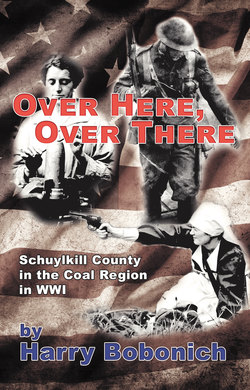Читать книгу Over Here and Over There - Harry Bobonich - Страница 11
На сайте Литреса книга снята с продажи.
ОглавлениеThe Beginning of the Global War
In the beginning, nations were talking to each other,
But more than that, there was hope.
Hope--that reason would prevail,
But after that, all hell broke loose.
The assassination, which was a localized event, had soon escalated into a dangerous system of alliances that led to the Great War.
On August l, 1914, Germany declared war on Russia and then on August 3, they also declared war on France. Britain declared war on Germany on August 4 after Germany invaded Belgium As the war progressed, other countries became involved in the conflict: Italy, Japan and the United States joined up with the Allies while the Ottoman Empire and Bulgaria sided with the Central Powers.
On August 3, British Foreign Secretary Sir Edward Grey said to a friend on the evening of Britain’s entry into the war as he looked from his office and over Saint James Park, “The lamps are going out all over Europe, we shall not see them lit again in our lifetime.” The day after the British entered the war, Henry James wrote the following to a friend, “The plunge of civilization into this abyss of blood and darkness . . . is too tragic for words.” When the British Empire became involved, a European war now became a worldwide war in its comprehensiveness.
(Grey’s words prompted Britain to commemorate the centennial of the declaration of war on Germany. A century later, at a service in Westminster Abbey, the lighted candles were snuffed out one after another, until only the lighted oil lamp remained lit at the Grave of the Unknown Warrior. Then at 11:00 p.m., that oil lamp was extinguished designating the time Britain entered the war. Also at 10:00 p.m., for one hour, the lights were turned off at feature sites including the Houses of Parliament, Durham Cathedral, Blackpool illuminations and Liverpool’s Liver building.)
The Battles of the Frontiers was a series of four separate engagements from August 7 -- September 13, 1914, between French and German forces during the opening month of the war; however, some Belgium and British troops were also involved in the fighting. The fighting took place on the Eastern frontier of France and southern Belgium. The German army invaded Belgium and Luxembourg, and then moved on its way to France. The ground forces then moved swiftly through Belgium. Author Michael Howard in his book, The First World War wrote: “Before them the German armies drove a flood of refugees who clogged the roads with carts bearing all that they could rescue of their possessions—the first trickle of that immense and miserable flood of uprooted humanity that was to characterize warfare for the rest of the century.”
In the Battle of the Frontiers, approximately 1.25 million French troops were involved, while the strength of the German army was about 1.3 million men. The small Belgium army totaled about 117,000 troops and the British forces only amounted to about 70,000 soldiers. The results of the global conflict were apocalyptic. The French casualties totaled 329,000 killed, wounded and missing, while the German losses totaled 305,554. The British casualties came to 29,597 and the Belgium forces lost about 4500 men. While the German thrust to Paris was halted, the Western Front--450 miles from the border of neutral Switzerland to the Belgian coast--eventually resolved into a long battle of attrition of trench warfare. While it was a German victory, the French and British managed to delay the German advance, which allowed the Allies to regroup and defend Paris at the First Battle of the Marne. (“Battle of the Frontiers,” Wikipedia n.a.n.d.)
On the Eastern Front, which was far more fluid, The Battle of Tannenberg took place from August 26—30, 1914. The outcome was a decisive German victory, even though they had been outnumbered two-to-one. Approximately 30,000 Russian troops were killed or wounded; and an additional 95,000 were captured. Approximately 60 trains were needed to transport all the captured equipment to Germany. The German losses were less than 20,000.
It was the most impressive and complete German victory of the war, and essentially ended Russia’s invasion of East Prussia. After Russian General Aleksandr Samsonov’s devastating and humiliating defeat, he could not face Tsar Nicholas II and chose to commit suicide by shooting himself.
